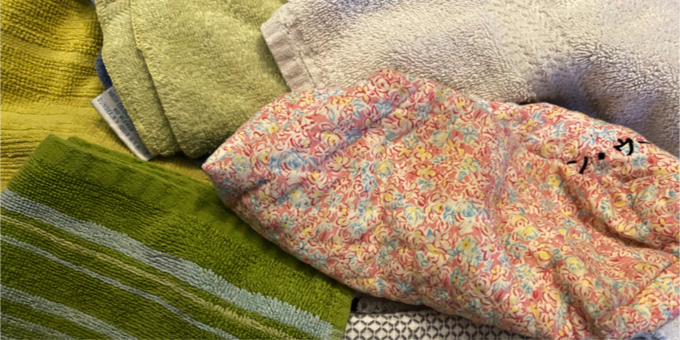Recycling old clothing, shoes and textiles is easy: make an appointment and set your items out in a plastic bag at the curb on the appointed day. You will even get a reminder email and/or text ahead of your appointment. Done!
Thanks to the City of Newton’s partnership with HELPSY, a for-profit B Corp with an environmental mission to change the way people think about clothing donation, it is easier than ever to donate your clothes and shoes for reuse and recycling, keeping them out of the wastestream. You should never place clothing and other textiles in your curbside recycling bin. Items will get tangled in recycling machinery and can cause injury to workers.
What to donate:
- Clothing: Shirts, pants, jackets, suits, hats, belts, ties, gloves, scarves, socks (even single ones) , undergarments, handbags, backpacks in any style, age or condition.
- Footwear: Shoes, sandals, sneakers, cleats, boots, flip-flops, and slippers.
- Household textiles (even stained and torn items): Curtains, drapes, sheets, blankets, comforters, towels, table linens, and throw rugs.
The only UNACCEPTABLE donations:
- Wet or moldy items.
- Items that are contaminated with oil or hazardous substances.
Donating old textiles has many environmental benefits:
- Textiles make up 5% of the waste stream in Massachusetts. This is low-hanging fruit to get out of the trash!
- Textile reuse and recycling has the second highest potential environmental impact on reducing greenhouse gases compared to other recyclables. Recycling 2.3 million tons of clothing per year is the equivalent of removing 1.3 million cars from U.S. roads.
- Textile recycling decreases the amount of trash we burn in waste-to-energy facilities.
Cotton is the most pesticide-dependent crop in the world. Cotton is the most pesticide-dependent crop in the world. It takes one-third of a pound of pesticides to make one t-shirt. - It can take 2,700 liters of water to produce the cotton needed to make a single t-shirt.
- Production of synthetic (petroleum-based) fibers like polyester and nylon produce volatile organic compounds, nitrous oxide (a greenhouse gas) and consumer large amounts of water.
What happens to the donated textiles?
- About 45% of donated textiles are sold as secondhand apparel, either through charitable organizations or for-profit exporters that sell baled clothing to developing countries.
- Organizations such as Goodwill and Salvation Army operate retail stores where donated clothing and household items are sold. Clothing and textiles that don’t sell in the stores are baled and sold to textile brokers. Both activities generate revenue to support their core missions.
- For-profit textile recyclers sort, grade and bale textiles and sell them to export markets. Clothing exports from North America supply high quality product to local entrepreneurs in Africa, Latin America, and other regions.
- Another 30% is turned into industrial wiping cloths. ERC Wiping Products (Lynn, MA) cuts used clothing and other textiles into rags and sells them to commercial garages and public works operations.
- The remaining 20% is sent to fiber converters like Millbury Textile Recycling (Millbury, MA) where textiles are broken down into their basic fiber components to be re-manufactured into insulation for autos and homes, carpet padding or soundproofing materials. Companies like Boston-based Project Repat make custom quilts and blankets out of old t-shirts. These “upcycled” products are sewn at factories in Woburn, Lawrence and New Bedford that pay workers a fair and living wage.



Recently on Twitter